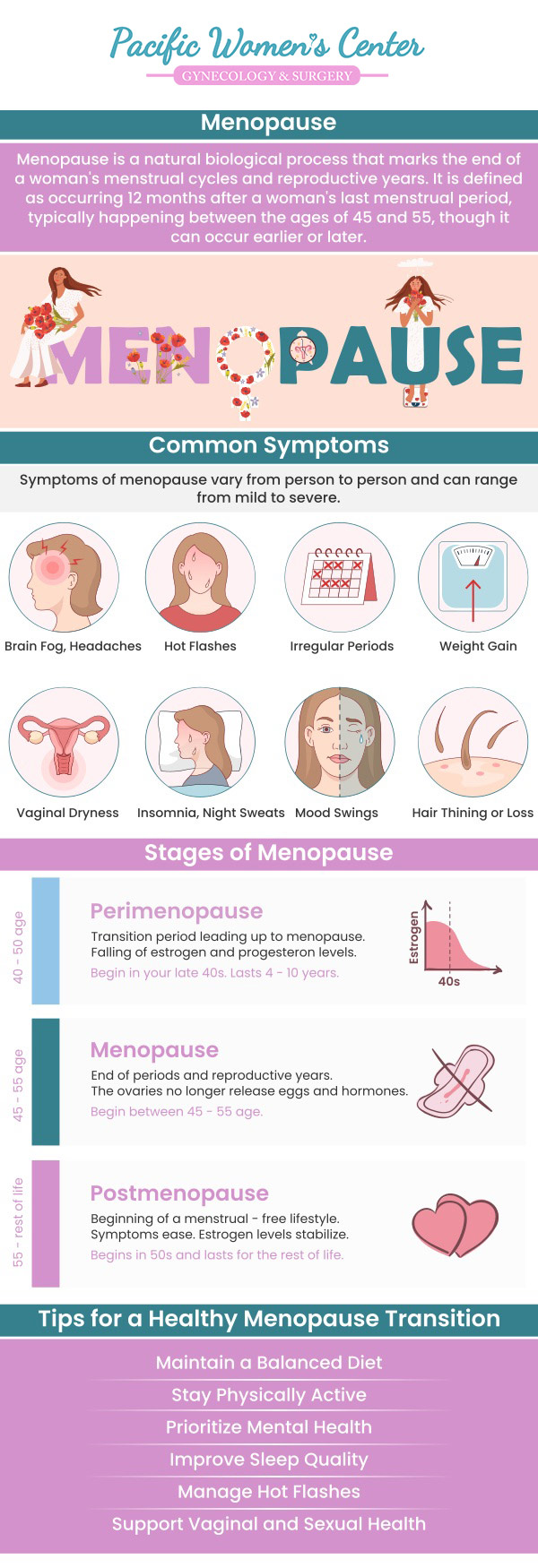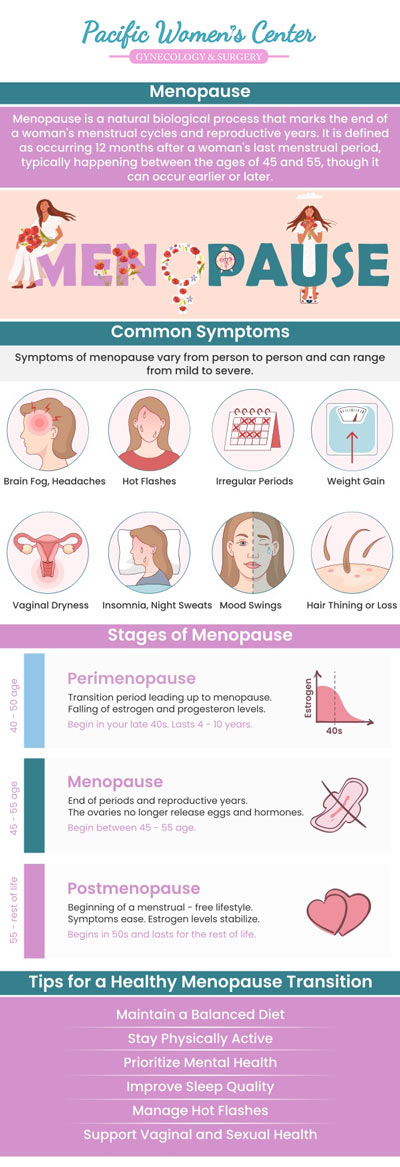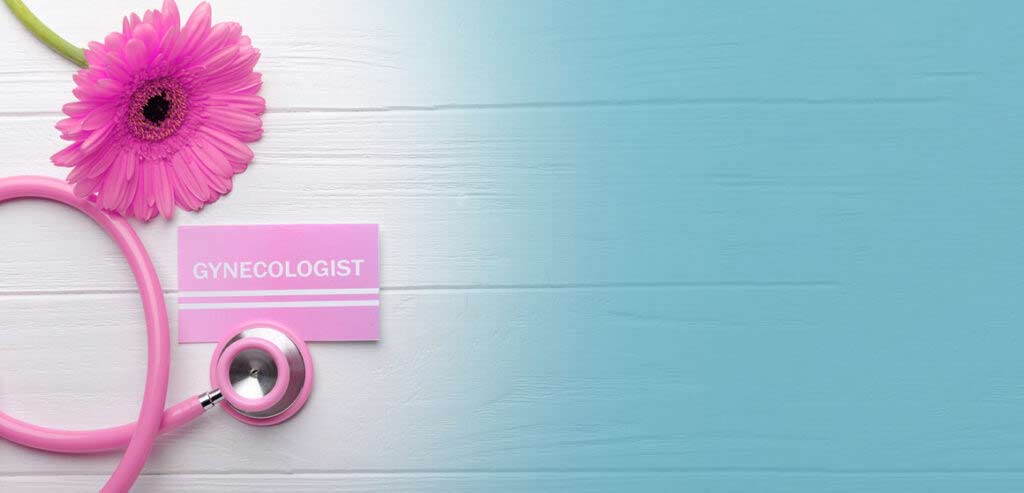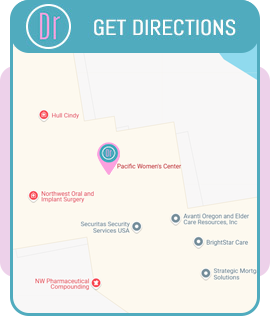Menopause and Sexual Health: What Changes to Expect
At Pacific Women’s Center, Dr. Richard A. Beyerlein and Dr. Tamara A. Stenshoel provide compassionate guidance on the changes menopause brings to sexual health. We help women understand and address common concerns, such as vaginal dryness and discomfort, which are often caused by declining estrogen levels. For more information, contact us or schedule an appointment online. We are located at 911 Country Club Rd. Suite 222 Eugene, OR 97401.


Table of Contents:
How does menopause affect sexual health?
Why does vaginal dryness occur during menopause?
Are there treatments for vaginal dryness during menopause?
How can I improve my sexual health during menopause?
At Pacific Women’s Center, we understand that menopause is a natural transition marking the end of a woman’s reproductive years. This stage often brings a range of changes, particularly in sexual health, due to declining levels of estrogen and other hormones.
One of the most common concerns we see among our patients is vaginal dryness. As estrogen decreases, the vaginal tissues can become thinner, less elastic, and produce less natural lubrication. This can lead to discomfort or pain during sexual intercourse, a condition known as dyspareunia.
Many women also notice a decrease in libido or reduced interest in sexual activity during menopause. Hormonal shifts can affect the body’s natural sexual response, making arousal and orgasm more challenging for some women. Decreased vaginal blood flow can further contribute to changes in sexual sensation.
Emotional and psychological changes, such as mood swings, anxiety, or body image concerns, can also impact sexual health. Disturbed sleep and hot flashes may lead to fatigue, which can reduce sexual desire or satisfaction. These physical and emotional changes can sometimes create stress or communication challenges within relationships.
It’s important to remember that every woman’s experience with menopause is unique. Some women notice significant changes, while others have little impact on their sexual health.
Vaginal dryness is a common and often uncomfortable symptom many women experience as they approach menopause, typically between the ages of 45 and 55. At Pacific Women’s Center, we understand how disruptive these changes can be to your daily life and intimate relationships.
The primary cause of vaginal dryness during menopause is a natural decrease in estrogen production. Estrogen is the hormone responsible for keeping the vaginal tissues healthy, elastic, and naturally lubricated. As estrogen levels drop, the vaginal walls can become thinner and less lubricated, which may cause discomfort, itching, or pain, especially during sexual activity.
Other factors can also contribute to vaginal dryness, including certain medications (such as antihistamines, antidepressants, or cancer treatments like chemotherapy and radiation), emotional stress, and even a decrease in sexual activity. Regular sexual stimulation can help maintain vaginal health, but every woman’s experience is different.
Our providers are dedicated to supporting you through every stage of menopause. If you are experiencing bothersome vaginal dryness, our compassionate team can offer guidance, recommend personalized treatment options—including over-the-counter lubricants, prescription therapies, or lifestyle adjustments—and help you find relief. We are here to answer your questions and ensure your comfort and well-being.
At Pacific Women’s Center, we understand that vaginal dryness during menopause is a common and often uncomfortable symptom for many women. This condition is primarily caused by decreased estrogen levels, which can result in thinning and drying of the vaginal tissues.
Our experienced providers offer a range of effective treatment options to help you find relief and improve your quality of life:
Over-the-Counter Solutions: Many women benefit from using vaginal moisturizers or water-based lubricants, especially during sexual activity. These products can help maintain moisture and reduce discomfort.
Systemic Hormone Therapy: For women experiencing additional menopausal symptoms beyond vaginal dryness, systemic hormone therapy (such as estrogen pills or patches) may be an option. Our providers will work with you to determine if this approach is appropriate for your specific needs.
Non-Hormonal Prescription Treatments: If you prefer to avoid hormones or have a history of hormone-sensitive conditions, non-hormonal options like ospemifene are available and can be discussed during your visit.
Lifestyle Guidance: Staying sexually active can promote blood flow and support vaginal health. Our team can offer practical advice on lifestyle changes that may help reduce symptoms.
Every woman’s experience with menopause is unique. At Pacific Women’s Center, our compassionate healthcare professionals are here to help you find the most effective and personalized treatment for vaginal dryness. If you’re experiencing persistent symptoms or have concerns about hormone-based therapies, schedule a consultation with us to discuss the best options for your health and comfort.
At Pacific Women’s Center, we understand that menopause is a significant transition in a woman’s life, and it can bring about changes that affect sexual health and intimacy. Our team is dedicated to helping you navigate these changes with compassion and expert care.
During menopause, hormonal shifts—especially the natural decline in estrogen—can lead to symptoms such as vaginal dryness, decreased libido, and discomfort during intercourse. These changes are completely normal, and you don’t have to face them alone. At Pacific Women’s Center, our providers can help you explore solutions tailored to your needs. Simple steps, such as using water-based vaginal lubricants or moisturizers, can alleviate dryness and make intimacy more comfortable. Regular sexual activity can also help maintain vaginal health by promoting blood flow and elasticity.
We encourage open communication between you and your partner to maintain intimacy and address any concerns together. If you’re experiencing a persistent drop in sexual desire or ongoing discomfort, our experienced healthcare team is here to listen and provide guidance. We offer a variety of treatment options, including localized estrogen therapy and non-hormonal alternatives, carefully chosen based on your personal and medical history.
Your overall health and lifestyle play a vital role in sexual well-being. Our providers at Pacific Women’s Center can advise you on strategies such as regular exercise, stress management, adequate sleep, and balanced nutrition—all of which support both your physical and sexual health. For more information, contact us or schedule an appointment online. We are located at 911 Country Club Rd. Suite 222 Eugene, OR 97401. We serve patients from Eugene OR, Springfield OR, Coburg OR, Creswell OR, Cottage Grove OR, Lowell OR, Junction City OR, and surrounding areas.

ADDITIONAL SERVICES YOU MAY NEED
❱ Abdominal Hysterectomy
❱ Bladder Lift Surgeon Q&A
❱ Cervical Cone Biopsy
❱ Colposcopy
❱ Endometrial Ablation
❱ Endometrial Biopsy
❱ Female Sexual Dysfunction
❱ Gynecological Surgery
❱ Gynecology
❱ Hormone Therapy
❱ Vaginal Hysterectomy
❱ Endometriosis Diagnosis & Care



